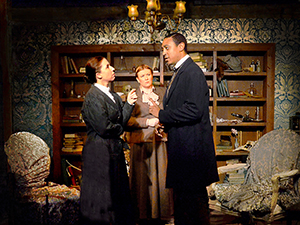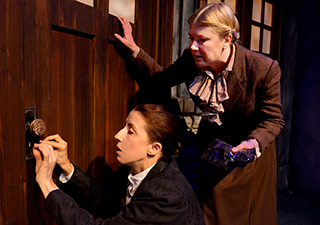From the Chicago Tribune
Twists, turns and a feminist insight in ‘Miss Holmes’
September 21, 2016
By Kerry Reid
★★★
Calling all Baker Street Irregulars: The place to be this fall in Chicago is Lifeline Theatre. Christopher M. Walsh’s “Miss Holmes” offers a cunning and highly enjoyable gender-bent take on Sir Arthur Conan Doyle’s maddeningly brilliant detective.
You’ll look in vain for a deerstalker cap, but other familiar elements are in place, including the cozy-but-cluttered sitting room at 221B Baker St., presented in Ashley Ann Woods’ set as an elevated sanctuary whose bookshelves burst with signs of curiosity — skulls, chemistry sets and the like. It suggests both the heightened intellect at work there and a place of refuge above the shadowy gaslit streets of London. (Nicely realized in Jordan Kardasz’s lighting design, and also augmented by Andrew Hansen’s ominous original music and soundscape.)
Gaslighting is definitely part of the game that is afoot here. When we first see her, Katie McLean Hainsworth’s Sherlock is wrapped in a straitjacket, sporting a black eye from a fight in the asylum where her brother, Mycroft, (played by Hainsworth’s husband, Chris Hainsworth), has dumped her. The siblings have, needless to say, a fraught relationship, brought on in part by Mycroft’s own mysterious government work — work that his inquisitive sister endangers from time to time.
In Walsh’s telling, this female Sherlock’s caseload is built primarily out of powerless-but-endangered women, such as Lizzie Chapman (Kate Nawrocki), the third wife of Scotland Yard detective Thomas Chapman (John Henry Roberts), whose previous spouses died under suspicious circumstances. (Paging Drew Peterson!) Lizzie shows up at Baker Street with an anonymous letter, warning her to leave her husband. Meantime, Inspector Lestrade (Christopher W. Jones) has his own suspicions about Chapman’s past that cause him to join forces with Holmes and Watson.
Both Walsh’s text and director Paul S. Holmquist’s staging feel a bit mannered in the early scenes. But particularly once Mandy Walsh’s Dr. Dorothy Watson is fully on board with her new roomie’s schemes, the fun really begins. Walsh manages the tricky task of providing both old-school fan service (Hainsworth’s Sherlock, even with a black eye, can tell almost everything about Dorothy’s educational background on first glance) and feminist insight.
If you peek into the narrative corners, you can see shadowy suggestions of everything from the Jack the Ripper slayings to Charlotte Perkins Gilman’s “The Yellow Wallpaper,” in which a Victorian woman who, like Sherlock, prizes the life of the mind is treated as a nervous hysteric.
Walsh’s script suggests that his Sherlock does have some real issues with mental health — which is one reason a friendship with someone like Dorothy offers solace and security. The intricate relationship between Mycroft and Sherlock gets teased out gradually, but with good effect. The two may disdain “sentiment,” but they understand each other more than they care to admit.
Watson’s past also includes tough struggles as a woman fighting (literally, in one remembered instance) to finish her medical education. She becomes more than just a loyal companion in Walsh’s telling. She is a needed buffer between Sherlock and the rest of the world.
While the terrific performances from Hainsworth’s Sherlock and Walsh’s Watson dominate the story, the supporting turns offer some fun interludes. Michael Reyes’ Dr. Michael Stamford, would-be fiance to Dorothy Watson, goes to town impersonating a German physician in a scheme to liberate Sherlock from the asylum once again. It’s a delicious take on the familiar straight-arrow character who finds that he enjoys a walk on the wild side. Roberts is appropriately cold and menacing as Chapman, and Abie Irabor delivers solid work in the trifecta of playing Watson’s boss at the hospital, Holmes’ exasperated landlady and the grieving mother of one of Chapman’s deceased wives.
Nawrocki’s seemingly dizzy Miss Lizzie delivers what could be the leitmotif for all the women in this male-dominated world when she responds to Sherlock’s observation, “You’re good at being underestimated” with, “Aren’t we all?” A certain female presidential candidate might have something to say on that score. And doesn’t it make sense that being invisible to most of society makes one a greater detective of human behavior than being the center of privilege and attention?
“Miss Holmes” doesn’t turn the Doyle mythology completely upside down, and some of the twists are pretty easy to see coming down the pike. But Walsh’s take suggests, with sympathy and wit, that being the world’s greatest detective is even harder when one is metaphorically doing it backward and in high heels.
From the Time Out Chicago
A simple gender swap brings fresh new life to the beloved detective and his companion
October 3, 2016
By Allison Shoemaker
★★★★
Sometimes the accents wander a bit, and it might be five minutes too long.
With that, there’s nothing negative left to say about Miss Holmes, a wildly winning world premiere from Lifeline Theatre that injects fresh life into the Arthur Conan Doyle oeuvre through the simple expedience of making Holmes and Watson both female. While that may sound gimmicky, the result is anything but. Playwright Christopher M. Walsh and director Paul S. Holmquist unearth new resonances in familiar aspects of the Holmesian world, all while remaining loyal to what the world has found compelling about Doyle’s stories for so many years.
And what makes the Conan Doyle stories so enduring? Holmes and Watson, of course. There’s nothing here that feels like pandering, no sense that a woman’s merely stepping into a pair of men’s shoes for the night. This Holmes and this Watson could only exist in this play, familiar in all the essentials—Holmes brilliant, troubled, lacking social grace and empathy; Watson sensible, loyal, equal parts dazzled and frustrated by her companion—but still utterly new. Their femininity is a fact, not a feature. Holmes is Holmes, Watson is Watson. They are largely the same, but the way in which the world reacts to them is dramatically different.
Much credit is due to the playwright, of course, but in any Holmes and Watson adaptation, things go nowhere without a worthy duo inhabiting those roles. In Katie McLean Hainsworth and Mandy Walsh, Holmquist and casting director Lavina Jadhwani have found a pair more than capable of rising to the occasion. Hainsworth and Walsh are a dynamite pair, nimbly leaping between expertly-landed punchlines and moments of pathos, imbuing both characters with humanity, dignity and fierce intelligence—Hainsworth in particular, whose performance is laced with an attention to detail that Holmes would likely appreciate. There’s no showboating, and no sense that either performer (or character) feels the need to prove anything to anyone. They’re here to do the work, dammit, and they do it extremely well.
They’re not alone. The rest of the ensemble, most of whom tackle multiple roles, enter Holmquist’s story with the same verve and vigor of the two leads. It’s difficult to identify standouts in a cast full of them, but Michael Reyes carries the play’s single funniest scene almost single-handedly, and Kate Nawrocki earns great empathy as the pair’s first, and largely unwilling, client.
The excellence continues: Ashley Ann Woods’s sumptuous scene design makes great use of Lifeline’s space, giving director Holmquist a chance to stage chase scenes through the London streets and tete a tetes inside 221B with equal ease. Rachel M. Sypniewski outfits the ensemble in period wear rich in texture and color, enabling the actors to deftly switch roles with ease—and never has seeing a female character step out in a pair of pants been quite so thrilling. Lighting (Jordan Kardasz), props (Holly McCauley), original music and sound (Andrew Hansen)—all excellent. And Holmquist uses all to great effect, offering up a staging that’s equal parts technical achievement and thoughtful interpretation.
Miss Holmes offers much in the way of pleasure to theatergoers. It’s fun, it’s thoughtful, it’s compelling and empowering and unexpected. But of all the delights it grants audiences, there’s one that surpasses the rest: It leaves plenty of room for, and even demands, a sequel. If there’s any justice in the world, we’ll get one. Should something this enjoyable find its way to a second chapter? Why, that’s elementary.
From Chicago Theatre & Concert Reviews
‘Miss Holmes’ a Delightfully Feminist Twist on an Old Tale
September 21, 2016
By Peter Thomas Ricci
HIGHLY RECOMMENDED
“Miss Holmes,” the world-premiere production that kicks off Lifeline Theatre’s 2016-2017 season, is two things at once: a sterling origin tale of the Sherlock Holmes/Doctor Watson partnership with all the wit, mystery, and dynamism one would expect of Arthur Conan Doyle’s famous detective; and a decidedly feminist take on that familiar tale, one that casts women in the roles of Holmes and Watson.
As with all Holmes tales, the setup is a simple one: Sherlock, recently sprung from prison by her brother Mycroft, is tasked by a seemingly fearful, naive wife of modest means to find out who is sending her letters of a warning nature – specifically, that her husband, a respected (albeit corrupt and feared) member of the Scotland Yard, is plotting to murder her. With her newly recruited sidekick, a disgruntled Dr. Watson, Holmes takes on the case, not knowing where it will ultimately lead. To reveal too much of the plot would spoil all the fun, but suffice to say, the action features numerous twists and turns, with the ultimate revelation being one of pure joy…with grisly undertones.
The key here is the casting and scripting. Holmes and Watson are such familiar characters that any actor risks mere replication, but Katie McLean Hainsworth’s Holmes and Mandy Walsh’s Watson are true originals, and they are complemented beautifully by Lifeline’s dialogue, which positively cackles with energy and delights in its commentary on Victorian England. Courtesy of Christopher M. Walsh, whose adaptation of “A Tale of Two Cities” was sublime, “Miss Holmes” never overplays its feminist politics, preferring instead to slowly build how disadvantaged Holmes and Watson are as intelligent, independent women in a society that so clearly does not value such attributes.
The entire cast is equally terrific: Chris Hainsworth relishes Mycroft’s thorniness; Abie Irabor is absolutely charming in her multiple roles; Christopher W. Jones, who was terrific in a number of DePaul productions while he was a student there, makes an excellent impression as Inspector Lestrade; and Michael Reyes, who was very funny in Stage Left’s production of “Mutt,” generates arguably the biggest laughs of the night with some of the most wildly gesticulated German on a Chicago stage.
From Splash Magazines
A Must-See Mystery at Lifeline Theatre
September 21, 2016
By Suzanne Magnuson
“Miss Holmes,” currently playing at the Lifeline Theatre from September 9–October 30, is a gender-swapped reimagining of Holmes and Watson. This may put some people off from the very first, but if you allow it to sway you, you will be missing as fine and entertaining a Sherlock Holmes play as any ever staged. Because that is what this is, A Sherlock Holmes play with all the characters you remember behaving as they characteristically do.
Holmes is brilliant and a master of deductive reasoning. Watson is empathetic and brave and clever. Lestrade is honest, but at a loss. Mycroft is mysterious and overbearing. Mrs. Hudson, traditional and motherly.
The play’s conceit is to invite us to imagine if the characters we know and love had been born at the same time, only as women. What challenges would they have faced in expressing their innate natures? This is the question the play by Christopher M. Walsh sets for itself while at the same time giving us an original Sherlock Holmes mystery to be investigated and solved using Holmes’ patented methods.
It is, in fact, when Holmes is using ratiocination to tell us all about someone that the play truly shines, as does Katie McLain Hainsworth as Sherlock Holmes. Her interpretation leans a bit more on contemporary, eternally-exasperated and rapid-fire Cumberbatch than note-perfect, snide Brett, but her Holmes is a credit to Conan Doyle’s creation as read on the pages of his stories and novels. She sometimes speaks a bit too quickly, and as some of the blocking has her turning away from the audience to speak to various other characters, sometimes the ends of her lines are lost. And there are great, intelligent and funny lines in this play. It’s a shame to lose any of them.
The playwright, Christopher M. Walsh, should particularly be commended. He has captured both Holmes and Watson’s characteristic ways of speaking and translated them to an entirely new mystery. One that is engaging and contains a twist or two and uses the fact that the main characters are now women to further the action and the plot. The gender-swap is not a bug, it’s a feature.
The fact that Holmes and Watson are now women merely adds a few more hurdles in their way, which the play deals with excellently. It’s clearly a feminist take on the subject and does shine a light on what women of the era faced when they attempted behavior deemed radically unconventional, but no more so than does George Gissing, Thomas Hardy or Virginia Woolf.
There are numerous callbacks to obscure bits of Sherlockiana including Stamford, the man who introduces Holmes and Watson in “A Study in Scarlet,” appearing here as Watson’s prospective beau and actually helping them at a crucial moment (and played charmingly by Michael Reyes). Holmes’ Baker Street Irregulars becoming Sherlock’s Knitting Circle consisting of a network of nosy old ladies and shop girls passing on all the news as well as other examples.
Mandy Walsh as Dr. Dorothy Watson is not only everything one could ask for in a stalwart sidekick, but she makes a case for the women who struggled to pioneer medicine as well. And her accent, voice and delivery is so very much like Deborah Kerr that it’s almost uncanny. While her scenes with Holmes are wonderful, she carries much of the play, herself, and that is just fine, as she is a superb Watson. Watson is our narrator, after all, and her point of view is what draws us in. I have no idea why she is not Jane Watson, however, an interesting choice on the playwright’s part.
The basic plot set up also stems from the gender-swapped nature of Holmes and Watson. The fact that they are women allows women to come to them in confidence with their problems, problems they don’t dare discuss with men. And that is where the mystery begins as Mrs. Lizzie Chapman, wife of Detective Chapman of Scotland Yard, needs help to discover who is behind the mysterious letters she is receiving warning her to beware of her husband.
I can’t discuss more without giving away portions of the mystery, but I need to laud the supporting cast, who do a great deal of heavy lifting, many in multiple, diverse and interesting roles. Abie Irabor is a delight whenever she’s on stage, whether she’s grumbling about irregularity as Mrs. Hudson, mentoring Watson as Dr. Anderson or engaging in geriatric paranoia as Eudora Featherstone. Kate Nawrocki as the client, Mrs. Chapman, the maid Peggy, or Martha, parades different regional and ethnic accents, physical attitudes and makes you forget you just saw her a moment ago as someone else. LaQuin Groves plays two characters of entirely different social classes and educational levels to the point where you can imagine their lives beyond the confines of the play. John Henry Roberts as Det. Chapman is as menacing a heavy as you could wish and bleeds lower-class London striver all over the stage. And Christopher Jones is the nicest Lestrade ever, and I’m going to fault or credit the writing here. Lestrade in Doyle comes off both dim and self-serving and is usually played a bit less posh than he appears here. This Lestrade is a dedicated public servant who understands his own limitations as is willing to go out on a limb to help Holmes when he sees she might be able to give him the proof he needs to close a case. He’s warm and sympathetic and you like him very much.
The show is well lighted, well designed, well costumed (other than Watson’s trousers) and you can mostly hear well except when Holmes turns toward the back of the stage in the “Baker Street” portion of the set. The one real oddity is the level of refrigeration in the space, however. I have never attended a theatre where they felt compelled to put blankets on the chairs. I was very grateful for mine by the second act. Take a sweater when you go. Because you should go, right away, and see this wonderful, original Sherlock Holmes mystery.
From Newcity
A Woman’s Eye
October 3, 2016
By Irene Hsiao
RECOMMENDED
Sherlock Holmes was the greatest detective England has ever known. Sherlock Holmes operated on a simple method of observation, ratiocination and deduction. Sherlock Holmes amplified the scratch, the mote, the speck and the drop to definitive narratives of disposition and culpability. Augmenting a consummate sensitivity with an intellect capable of accommodating such a faculty, there was but one miniscule detail about his notorious hero that Sir Arthur Conan Doyle omitted from the view of his Victorian audience: Sherlock Holmes was a woman. More than one hundred years after Holmes’s first appearance, Christopher M. Walsh takes the thought experiment to its logical conclusion in his new play “Miss Holmes,” directed by Paul S. Holmquist and executed with precision, pluck and commitment in a riveting production by the Lifeline Theatre Ensemble.
What if Holmes were a woman? Would she be able to roam at ease from Scotland Yard to the opium dens, scratch out melancholy ruminations on her violin at all hours, conduct chemistry experiments at home, ruthlessly demand tea and obedience from Mrs. Hudson, freely castigate Lestrade? Would she have a band of rambunctious youths at her beck and call? Would helpless women weep in her Baker Street flat, faint smudges on their otherwise white gloves revealing the provenance of the hansom driver that had gone a circuitous route to the door? What if Dr. Watson were also a woman—would she be able to assert her diagnoses so resolutely, demand first audience with bleeding victims, wield her little pistol with the cool aplomb of ownership?
Walsh’s lonely Holmes (Katie McLean Hainsworth) is sorely in need of the companionship found in her doughty second, Watson (Mandy Walsh), a spirited rebel who hasn’t forgotten her part in the Surgeon’s Hall Riot of 1870, where she and other women resisted humiliation and abuse to study medicine. Together, they investigate the mysterious deaths of several women, thwarting not only the nefarious schemes of murderers and crime bosses but also the patronizing supervision of Holmes’s brother Mycroft (Chris Hainsworth), who pays Watson to inform upon and chaperone a sister whose acuity is conflated with madness.




























